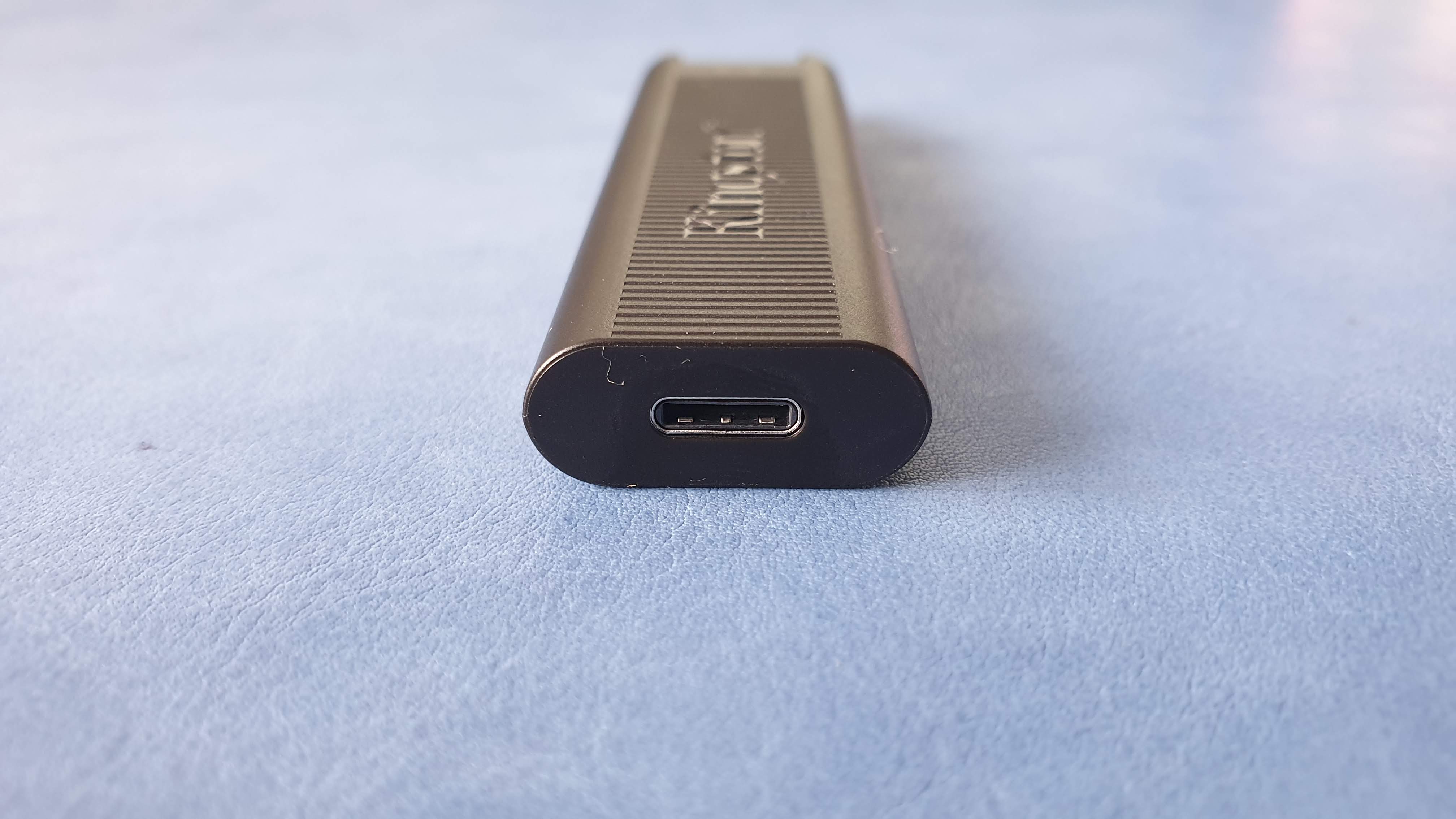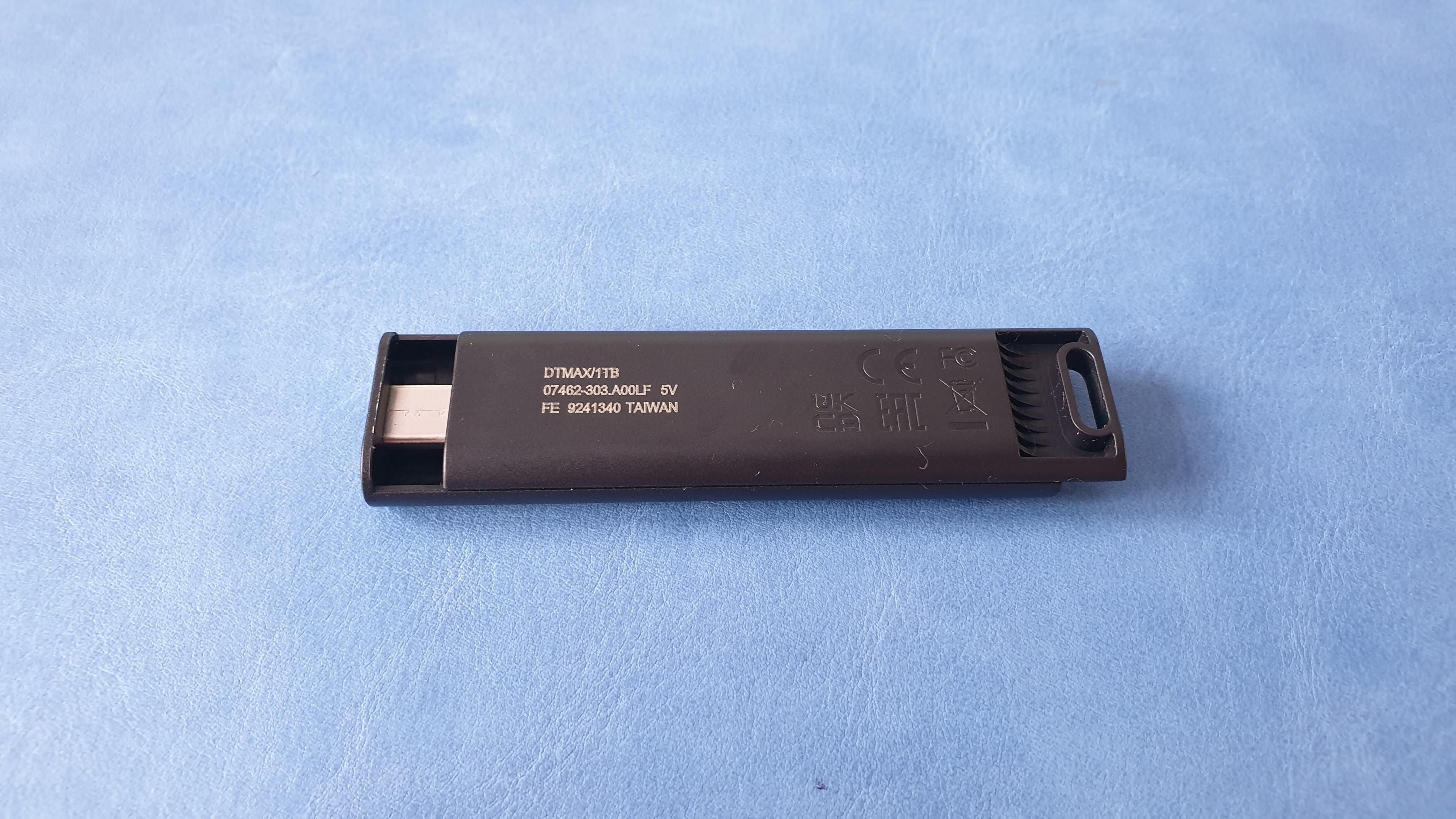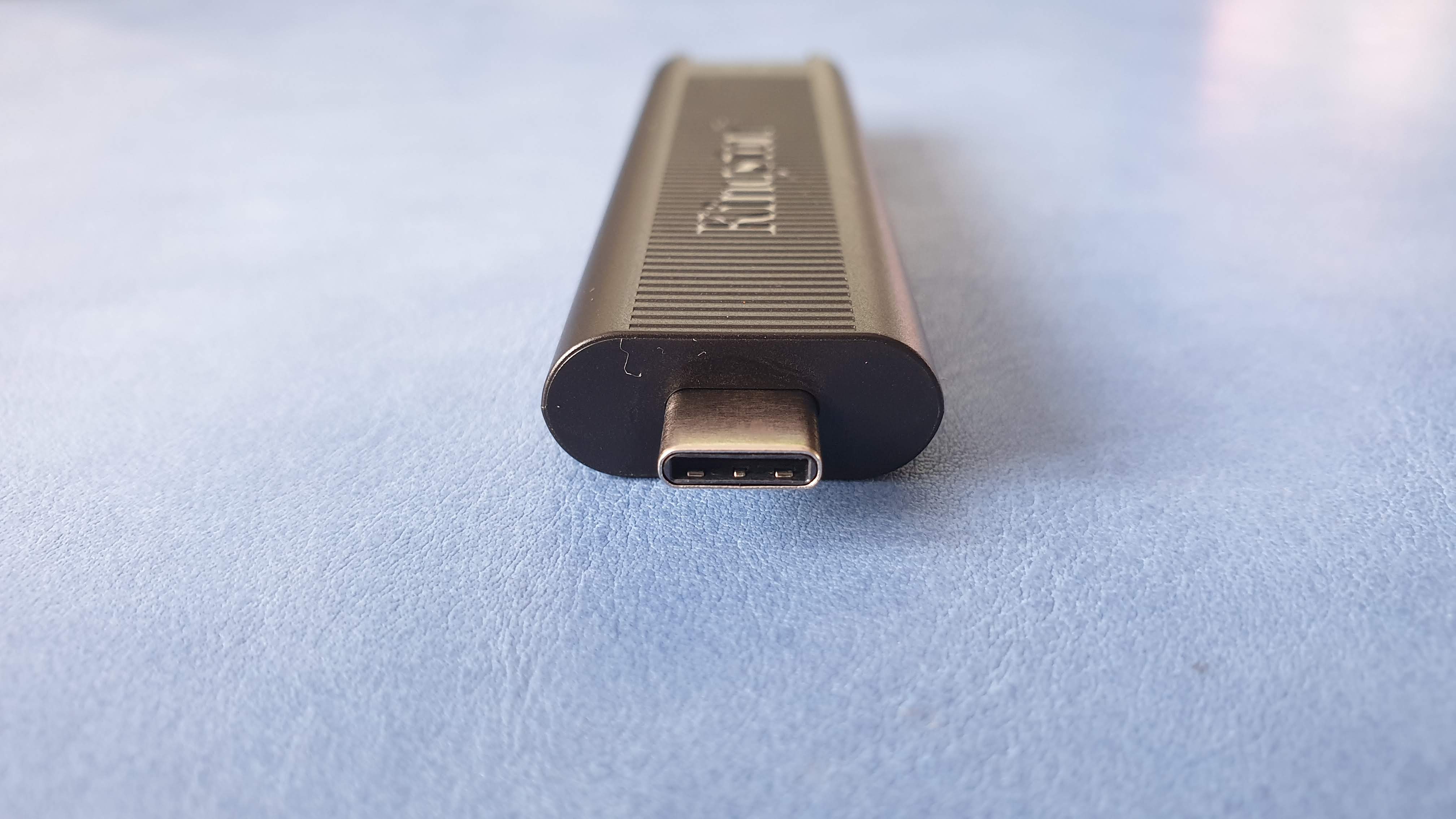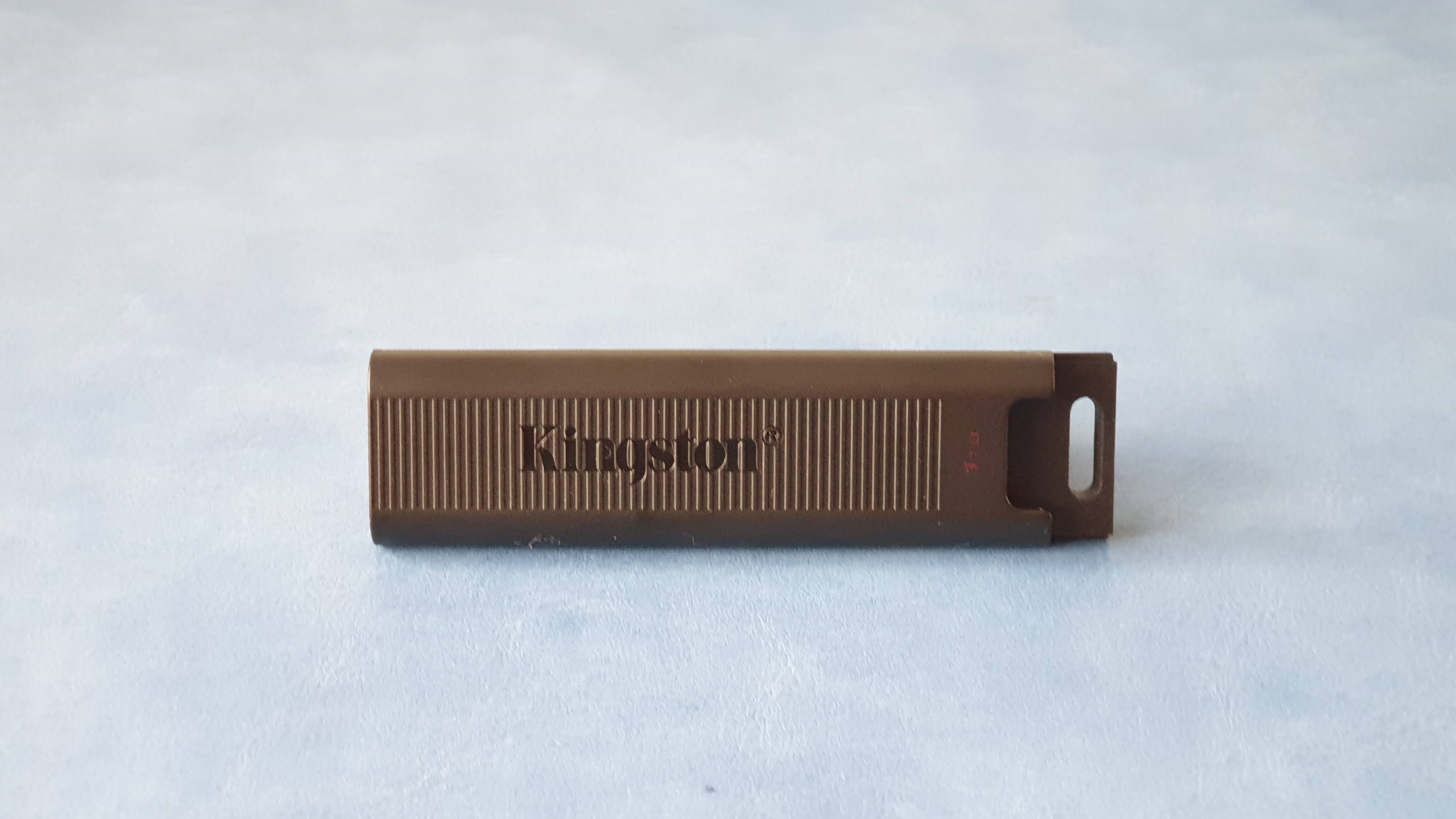TechRadar Verdict
The Kingston DataTraveler Max 1TB USB flash drive has it all (or almost). It is blazingly fast, small and it doesn’t carry such a big premium compared to a traditional portable SSD. Its lack of a Type-A connector may limit its appeal for those looking for backward compatibility but others will just look past that.
Pros
- +
Plastic chassis
- +
Small
- +
Reasonably priced
- +
Excellent performance
Cons
- -
Not rugged
- -
Lack of security features
- -
Type-C port limits compatibility
Why you can trust TechRadar
Two minute review
Who needs an external solid state drive when you’ve got something like the Kingston DataTraveler Max 1TB USB flash drive. This 1TB removable storage device may be small in size but it promises to deliver some spectacular performance thanks to a combination of high speed USB 3.2 Gen 2 Type-C connector and fast TLC flash memory from Micron TLC.
Kingston’s speed champion is fast enough to compete with many far bigger portable SSDs that usually require an additional cable to connect and while it is not the cheapest of the lot, its portability combined with its simplicity of use should propel it high on the list of those who want a capable, fast external storage option.
There are other, slower or far bigger options available like the 1TB HP x796w that comes with the more universally accepted USB Type-A connector but it is likely to be far, far slower and is only about 15% cheaper. It doesn’t come with any software bundle though which is something we’d like more vendors to consider as it offers an option to customers to get protection for their data out of the box.
All in all though, the Kingston DataTraveler Max is a stellar example of a vendor striking the right balance in a very competitive market that many thought had gone stale.
- Also check out our roundup of the best rugged had drives
Pricing and availability
The Kingston DataTraveler Max comes in 256GB, 512GB and 1TB models. The latter is by far the best value for money of the three and can be had for just under $166 (currently on preorder at US retailer B&H).

Design
At 83mm x 22mm x 10mm with a weight of only 12.5g, this is a bigger-than-expected USB flash drive but is still far more compact than any portable SSD on the market and that includes the now-defunct Ravpower Mini. Its body is made almost entirely of plastic and has a Type-C USB connector that’s retractable and can be operated with one hand.

There’s a keyring loop, a tiny blue status light and the ribbed back of the drive makes it easier to slide the drive cover - no chance of messing up or losing a cap here. Its appeal as a USB stick is evident as it represents the perfect balance between extreme portability (a 1TB microSD in a Type-C card reader), price and speed.

Performance and in use
Kingston claims that the DataTraveler Max 1TB will reach read/write sustained speeds of 1GBps and 0.9GBps respectively. The drive uses Silicon Motion’s SM2320 UFD controller and Micron’s 96-layer 3D TLD storage. Silicon Motion’s chip is a native controller which helps improve performance, heat dissipation, bill of material and design. We carried our tests using our standard Intel-based test device, the Kubb Bleujour mini PC.
Here’s how the Kingston DataTraveler Max performed in our suite of benchmark tests:
CrystalDiskMark: 1066MBps (read); 1000MBps (write)
Atto: 1018MBps (read, 256mb); 950MBps (write, 256mb)
AS SSD: 943Bps (seq read); 895MBps (seq write)
AJA: 912MBps (read); 896Mbps (write)
The drive performed admirably, scoring a superb 1066MBps and 1000MBps on CrystalDiskMark and moving a 10GB file with an average transfer rate speed of 558MBps. The other tests carried out (AJA, ATTO, AS SSD) all underline the true nature of the DataTraveler Max as a 1GBps-class storage device.
The drive didn’t get too warm during testing despite the lack of a metal enclosure (which would double as a heatsink) although your mileage may vary depending. One of the great things about having such a storage solution is that it is natively compatible with most recent Android smartphones with USB Type-C. On the other hand, it means using a compulsory converter (Type-A to Type-C) on older desktop computers or laptops.
A follow-up with an extra USB Type-A connector might be a welcome addition but that might add to the weight, complexity and price. A smaller body is another distinct possibility given how small the component board is inside.
A 2TB model is unlikely to be on the way soon because the market for it is likely to be tiny unless use cases requiring such storage capacities become more prevalent. A 2TB USB Flash drive will likely be a very pricy halo product, not unlike the original 1TB DataTraveler HyperX Predator 3.0 which launched nearly a decade ago.

Should I buy the Kingston DataTraveler Max 1TB USB flash drive?
Buy if if:
You’re yearning for something ultra compact and fast
It is pocketable, doesn’t require an extra cable and is far lighter than any external SSD we’ve come across. Although there are some use cases where an external storage device with a USB cable would be preferable (e.g. when the connector is at the back of a desktop PC), we believe that this solution is superior.
You’re looking for peace of mind
While it doesn’t come with any recovery or backup services (like Seagate), the DataTraveler is backed by a five-year warranty courtesy of Kingston, one of the largest memory and USB flash drive manufacturers.
Don’t buy if if:
You only care about the cheapest 1TB USB flash drive
There are cheaper 1TB USB sticks but they tend to be slower, far slower; Sandisk’s 1TB Ultra Dual Drive Luxe USB Type-C flash drive sells for around $122 although you can get it for just over $100 at Amazon at the time of writing.
You need a rugged or secure solution
The DataTraveler Max is not a secure or a rugged solution. It doesn’t come with a fingerprint reader, IP67 rating or any security software bundles (e.g. file encryption, cloud backup etc).
- We've also highlighted the best USB flash drive

Désiré has been musing and writing about technology during a career spanning four decades. He dabbled in website builders and web hosting when DHTML and frames were in vogue and started narrating about the impact of technology on society just before the start of the Y2K hysteria at the turn of the last millennium.
